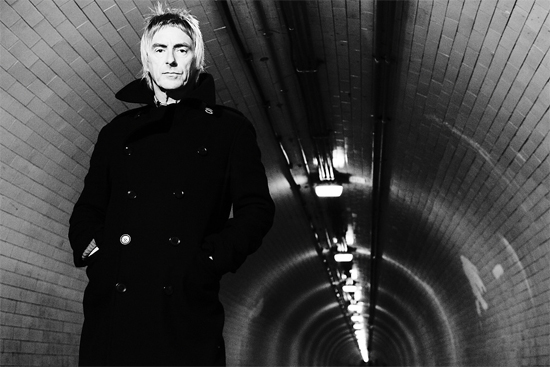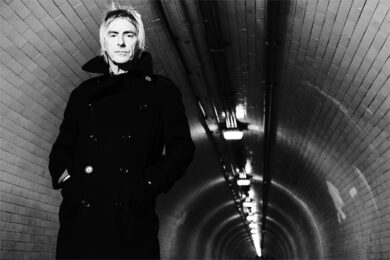"Well, I didn’t hate it," sighs the fella next to The Quietus at the end of Paul Weller’s first set at The Roundhouse. This is the inaugural night of The Modfather’s five-night stand at the legendary North London venue, and the Woking wonder has elected to play his new solo album, the splendid Sonik Kicks, in its entirety almost 12 hours before it hits the shelves. Following on from his creative rebirth with 22 Dreams and the award-winning and Mercury Prize-nominated Wake Up The Nation, Weller has once again refused to look back at former glories and has followed his muse into uncharted waters. For his new album, this means a flirtation with motorik beats, psychedelia, sequencers and a Technicolor approach to his work. The end result is another in a line of career highlights.
Not that any of this should be a surprise to anyone, let alone the legions of fans who have slavishly followed him since The Jam first appeared in the wake of punk’s first flush of life. This, after all, was the man who broke that trio up at the height of their fame and continued to confound expectations by joining with Merton Mick for their singular adventures with The Style Council.
In the upstairs bar, less charitable voices are making themselves heard.
"Shocking!" exclaims one aging fan to his equally apoplectic friend. "Fucking shocking! I saw him at the Albert Hall in the 80s and if he’d have done that then we’d have taken the fucking stage!"
What could be the problem, wonders the Quietus? Could it be Weller’s desire to seek out more experimental avenues and take his audience with him?
"That wasn’t experimental," comes the reply. "That was fucking shit!"
Counter opinions are being expressed. "I’m happy for him to take me somewhere new," explains a supporter of Weller’s as waits for his beer. "If I wanted to hear just the old stuff then I’d stay at home and listen to the albums."
Just 45 minutes earlier, a beaming Paul Weller bounds on to the stage. From the moment he straps his guitar on the and the squelching sequencers usher in the squalling psychedelia of ‘Green’, it’s damn obvious that this is where Weller’s head is at. So why the negative and shocked reaction from certain quarters? Speaking to the Quietus two years ago, Weller said, "I’ve opened up to so many forms of music, and I think the older I’ve got the more open-minded I’ve become, and I just wanna hear everything these days, because there’s so little time, and I just wanna hear as much as I can really."
Weller’s newly expanded musical horizons are much in evidence, and song titles such as ‘Kling I Klang’ drop huge hints as to what he’s been listening to and soaking up. Elsewhere, Weller’s discovery of Neu! is displayed on the propulsive Dragonfly and deliciously hypnotic Around The Lake, but perhaps the biggest surprise comes in the form of ‘Study In Blue’. Joined by his wife, Hannah, on vocals, the track is, to these ears, the least satisfying moment on Sonik Kicks but here its move into an extended reggae work out is both convincing and compelling.
Any dissenters thinking they’re in for an easy ride during the second of tonight’s two sets find themselves equally challenged. The Jam’s ‘English Rose’ opens the acoustic section to huge roars but this proves to be something of a red herring, as Weller steers the rest of his set in favour of material weighted towards his most recent releases. As the final notes of ‘Black River’ fade away, a voice yells out from the rear, "Bring on the old school!" and despite cheers of agreement from blokes whose faces reveal expressions of betrayal, Weller gleefully dives in to ‘Moonshine’, ‘Fast Car/Slow Traffic’ and ‘Wake Up The Nation’.
Tellingly, ‘The Changingman’ receives the biggest cheer of the night though Weller singing, "Numbed by the effect / Aware of the muse / Too in touch with myself / I light the fuse" is clearly lost on those refusing to accept the singer’s embrace of the here and now.
A few people start to head for the exit signs before the end of the gig, but one suspects that for them the climax of ‘Whirlpool’s End’ would have been too little too late. Ultimately, that’s their loss, and it’s hard to fathom why the past is held in such thrall when the present offers such delights. It could well be that a small minority of tonight’s crowd are simply too scared of letting go of the past for fear of acknowledging the present. Not so their hero, an artist only too aware of the passing of time and the inevitability of mortality. Unlike so many artists of his generation who are content to be stuck in some kind of musical variant of Groundhog Day, Paul Weller remains an inquisitive and curious musician. For this alone he should be applauded. But the fact that he’s creating some of the best music of his career and refusing complacency from his audience marks Weller out as talent still worth watching. Where he goes to next is anybody’s guess but whatever it’ll be, it won’t be lazy.



